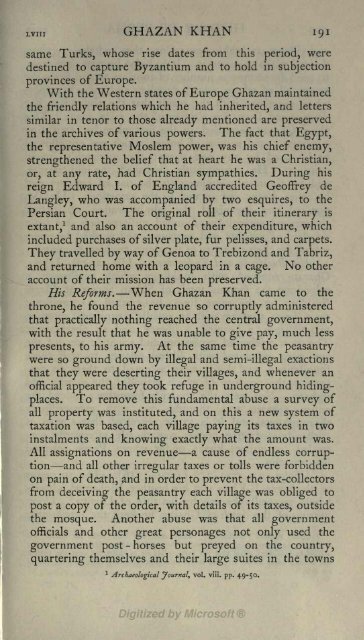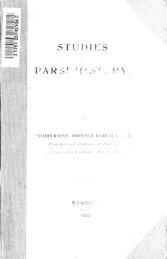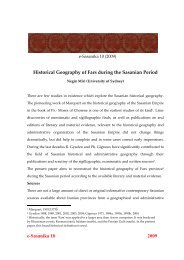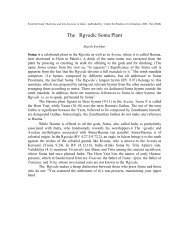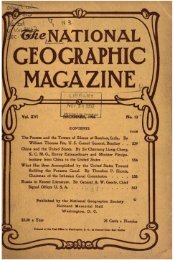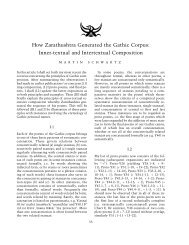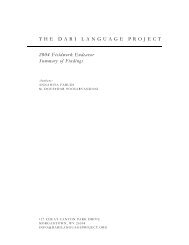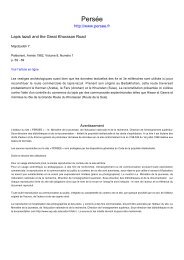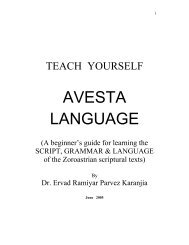- Page 6 and 7:
MACMILLAN AND CO., LONDON BOMBAY CA
- Page 8:
(Through the courtesy of Doctor Ahm
- Page 11 and 12:
A HISTORY OF PERSIA BY LIEUT. -CoL.
- Page 13 and 14:
-v'l PART OF A PERSIAN HUNTING SCEN
- Page 15 and 16:
-. CONTENTS Khorasan under the Cali
- Page 17 and 18:
CONTENTS ix CHAPTER LV PAGE THE MON
- Page 19 and 20:
CONTENTS xi CHAPTER LXI LITERATURE
- Page 21 and 22:
CONTENTS xiii CHAPTER LXVIII PAGE T
- Page 23 and 24:
CONTENTS xv CHAPTER LXXIV THE FOUND
- Page 25:
CONTENTS xvii CHAPTER ..... LXXX PA
- Page 28 and 29:
xx HISTORY OF PERSIA FACE PAGE . .
- Page 30 and 31:
MOHAMED SHAYBANI. MAPS VOL. To illu
- Page 33 and 34:
THI-; OPENING SURA OF THE KORAN. CH
- Page 35 and 36:
XLIV CAREER OF MOHAMED AT MECCA 3 r
- Page 37:
THE KA.MJ.V (From a Persian MS. in
- Page 40 and 41:
6 HISTORY OF PERSIA CHAP. but at la
- Page 42 and 43:
8 HISTORY OF PERSIA CHAP. Upon the
- Page 44:
io HISTORY OF PERSIA CHAP. admired
- Page 48:
12 HISTORY OF PERSIA CHAP. XLIV by
- Page 52:
1 4 HISTORY OF PERSIA CHAP. majorit
- Page 56 and 57:
1 6 HISTORY OF PERSIA CHAP. which t
- Page 58 and 59:
1 8 HISTORY OF PERSIA CHAP. God to
- Page 60 and 61:
20 HISTORY OF PERSIA CHAP. of refus
- Page 62 and 63:
22 HISTORY OF PERSIA CHAP. Spain th
- Page 64 and 65:
24 HISTORY OF PERSIA derided the im
- Page 66 and 67:
26 HISTORY OF PERSIA CHAP. 1. That
- Page 68 and 69:
28 HISTORY OF PERSIA Moslems lost 1
- Page 70 and 71:
30 HISTORY OF PERSIA CHAP. was stil
- Page 72 and 73:
32 HISTORY OF PERSIA CHAP. The Expa
- Page 74 and 75:
34 HISTORY OF PERSIA CHAP. The Proc
- Page 76 and 77:
3 6 HISTORY OF PERSIA but also in P
- Page 79 and 80:
ISLAM UNDER FIRST FOUR CALIPHS 37 H
- Page 81 and 82:
(Through the courtesy of H.E. the P
- Page 83 and 84:
THE TRAGEDY OF KERBELA 41 stances a
- Page 87 and 88:
THE TRAGEDY OF KERBELA 43 arrow, an
- Page 89:
THE PULPIT OF THK MAHDI. (In the Mo
- Page 92 and 93:
46 HISTORY OF PERSIA CHAP. XLVII It
- Page 94 and 95:
48 HISTORY OF PERSIA Caliph's publi
- Page 96 and 97:
50 HISTORY OF PERSIA CHAP. the troo
- Page 98 and 99:
52 HISTORY OF PERSIA CHAP. serving
- Page 100:
54 HISTORY OF PERSIA CHAP. The Achi
- Page 104 and 105:
56 HISTORY OF PERSIA CHAP. The Abba
- Page 106 and 107:
58 HISTORY OF PERSIA CHAP. of the h
- Page 108 and 109:
60 HISTORY OF PERSIA CHAP. XLVIH qu
- Page 110:
62 HISTORY OF PERSIA CHAP. is the t
- Page 113:
40 U G H R %.A S /A N Andarabah '^a
- Page 116:
64 HISTORY OF PERSIA c thou art a m
- Page 120 and 121:
66 HISTORY OF PERSIA daughter Khayz
- Page 122 and 123:
MAMUN AND THE IMAM RIZA. CHAPTER L
- Page 124 and 125:
70 HISTORY OF PERSIA and above all
- Page 126:
72 HISTORY OF PERSIA which he at le
- Page 130:
74 HISTORY OF PERSIA CHAP. and on M
- Page 134 and 135:
76 HISTORY OF PERSIA China date fro
- Page 136 and 137:
78 HISTORY OF PERSIA protest of hum
- Page 138 and 139:
80 HISTORY OF PERSIA of hard fighti
- Page 140 and 141:
AMR-UL-LAIS. CHAPTER LI THE DECAY O
- Page 142:
84 HISTORY OF PERSIA broke out in e
- Page 145:
CENTRAL ASIA London: Macmilla,n &.
- Page 149 and 150:
DECAY OF THE CALIPHATE 85 ruled the
- Page 151 and 152:
DECAY OF THE CALIPHATE 87 him, late
- Page 153 and 154:
DECAY OF THE CALIPHATK 89 and drove
- Page 155 and 156:
DECAY OF THE CALIPHATE 91 succeeded
- Page 157:
'>;>i>t n phot t\$i'af>h I'V Major
- Page 160 and 161:
94 HISTORY OF PERSIA robber called
- Page 162 and 163:
9 6 HISTORY OF PERSIA able man exte
- Page 164 and 165:
, rfl| . TOGHRII, BEG. CHAPTER LII
- Page 166 and 167:
ioo HISTORY OF PERSIA CHAP. invader
- Page 169 and 170:
THE SELJUK TURKS 101 the ground, an
- Page 171 and 172:
I _ LII THE SELJUK TURKS 103 lifeti
- Page 173 and 174:
! played THE SELJUK TURKS 105 vast
- Page 175 and 176:
LIT THE SELJUK TURKS 107 The Minist
- Page 177 and 178:
LII THE SELJUK TURKS 109 present da
- Page 179 and 180:
i ALilik 1X04) THP: SELJUK TURKS 1
- Page 181 and 182:
i THE SELJUK TURKS 113 and when rep
- Page 183 and 184:
THE SELJUK TURKS 115 Some ten years
- Page 185 and 186:
LI, THE SELJUK TURKS 117 at that ti
- Page 187 and 188:
CH.LIII DISRUPTION OF SELJUK EMPIRE
- Page 189 and 190:
DISRUPTION OF SELJUK EMPIRE 121 and
- Page 191 and 192:
DISRUPTION OF SELJUK EMPIRE 123 lef
- Page 193:
a I
- Page 196:
126 HISTORY OF PERSIA CHAP. relatio
- Page 200 and 201:
128 HISTORY OF PERSIA CHAP. notice,
- Page 202 and 203:
FROM THE "DIWAN" OF NASIR-I-KHUSRU.
- Page 204 and 205:
1 32 HISTORY OF PERSIA CHAP. I prop
- Page 206 and 207:
i 3 4 HISTORY OF PERSIA Tabaran dis
- Page 209 and 210:
PERSIAN LITERATURE 135 was written
- Page 213 and 214:
LIV PERSIAN LITERATURE 137 Omar Kha
- Page 217 and 218:
LIV PERSIAN LITERATURE 139 mysticis
- Page 219:
X \ & < < --> -1.
- Page 222 and 223:
1 42 HISTORY OF PERSIA CHAP. Anothe
- Page 224 and 225:
MANGU. CHAPTER LV THE MONGOL CATACL
- Page 226 and 227:
146 HISTORY OF PERSIA CHAP. and to
- Page 229 and 230:
THE MONGOL CATACLYSM 147 of his imm
- Page 231: l>fc :* A *! Ti" I I KARA KHITAN, S
- Page 234 and 235: 1 50 HISTORY OF PERSIA CHAP. who wa
- Page 236 and 237: 1 52 HISTORY OF PERSIA their own bo
- Page 238 and 239: i 5 4 HISTORY OF PERSIA To remedy t
- Page 240 and 241: 156 HISTORY OF PERSIA CHAP. for a v
- Page 242 and 243: 1 58 HISTORY OF PERSIA CHAP. shot a
- Page 244 and 245: 160 HISTORY OF PERSIA was almost ex
- Page 246 and 247: HULAGU. CHAPTER LVI THE EXTINCTION
- Page 248 and 249: 164 HISTORY OF PERSIA Tartars, and
- Page 250 and 251: 1 66 HISTORY OF PERSIA intrepid sol
- Page 252 and 253: 1 68 HISTORY OF PERSIA CHAP. spared
- Page 254 and 255: i yo HISTORY OF PERSIA CHAP. Karaco
- Page 257 and 258: LVI EXTINCTION OF THE CALIPHATE 171
- Page 259 and 260: LVI EXTINCTION OF THE CALIPHATE 173
- Page 261: TIIK SIKGK OF BAGHDAD BY HULAGU KUA
- Page 264 and 265: 1 76 HISTORY OF PERSIA CHAP.LVI Ass
- Page 266 and 267: 178 HISTORY OF PERSIA Court. She is
- Page 268 and 269: i8o HISTORY OF PERSIA CHAP. exclaim
- Page 270: 1 82 HISTORY OF PERSIA had been est
- Page 274 and 275: 1 84 HISTORY OF PERSIA bad, so that
- Page 276 and 277: 1 86 HISTORY OF PERSIA two years la
- Page 278 and 279: GHAZAN. CHAPTER LVIII That which wa
- Page 280 and 281: 1 90 HISTORY OF PERSIA thousand men
- Page 284 and 285: 1 92 HISTORY OF PERSIA and villages
- Page 286: i 94 HISTORY OF PERSIA had married
- Page 290 and 291: 1 The authorities for this chapter
- Page 292 and 293: 198 HISTORY OF PERSIA His Birth in
- Page 295 and 296: f TAMERLANE 199 treachery, and they
- Page 297 and 298: i (1369-1380). ! 782 - TAMERLANE 20
- Page 301 and 302: TAMERLANK 203 upon the summit of th
- Page 303 and 304: LIX TAMERLANE 205 residence and the
- Page 305 and 306: TAMERLANE 207 doom of the Muzaffar
- Page 307 and 308: TAMERLANE 209 in the stricken field
- Page 311 and 312: MX TAMERLANE 211 " ornamented very
- Page 313: AT THE DOOR OF TAMERLANE'S TOMB. (F
- Page 316 and 317: 2i 4 HISTORY OF PERSIA proposed the
- Page 319 and 320: LIX TAMERLANE 215 and in an absolut
- Page 321 and 322: CH...X THE TIMURID MONARCHS 217 the
- Page 323: A SORTIE FROM SAMAKCAND. (From the
- Page 326: 220 HISTORY OF PERSIA The "Black Sh
- Page 330 and 331: 222 HISTORY OF PERSIA Nicolo Crespo
- Page 333 and 334:
THE TIMURID MONARCHS 223 Buher. No
- Page 335 and 336:
THE "DIWAN" OF JALAL-U-DIN, RUMI. (
- Page 337 and 338:
I.XI LITERATURE UNDER MONGOLS 227 n
- Page 339 and 340:
LITERATURE UNDER MONGOLS 229 the Ko
- Page 341 and 342:
LXI LITERATURE UNDER MONGOLS 231 he
- Page 345 and 346:
LITERATURE UNDER MONGOLS 233 The hi
- Page 347 and 348:
LXI ARCHITECTURE UNDER MONGOLS 235
- Page 351 and 352:
LXI ARCHITECTURE UNDER MONGOLS 237
- Page 355 and 356:
ARCHITECTURE UNDER MONGOLS 239 supp
- Page 357 and 358:
CH.LXH RISE OF THE SAFAVI DYNASTY 2
- Page 359 and 360:
RISE OF THE SAFAVI DYNASTY 243 rapi
- Page 363 and 364:
LXII RISE OF THE SAFAVI DYNASTY 245
- Page 367 and 368:
LX,I RISE OF THE SAFAVI DYNASTY 247
- Page 369:
. ' 3
- Page 372 and 373:
2 50 HISTORY OF PERSIA Jenkinson, a
- Page 374 and 375:
2 52 HISTORY OF PERSIA to repair an
- Page 376 and 377:
254 HISTORY OF PERSIA CHAP. of the
- Page 378 and 379:
HOLOGRAPH DOCUMENT SIGNED BY SHAH A
- Page 380 and 381:
f, 258 HISTORY OF PERSIA CHAP. owin
- Page 383 and 384:
SHAH ABBAS THE GREAT 259 the throne
- Page 385 and 386:
. SHAH ABBAS THE GREAT 261 declared
- Page 387 and 388:
SHAH ABBAS THE GREAT 263 his was th
- Page 389 and 390:
SHAH ABBAS THE GREAT 265 Cotton, to
- Page 391 and 392:
SHAH ABBAS THE GREAT 267 that he dr
- Page 393 and 394:
: SHAH SUI.AYMAN. CHAPTER LXIV THE
- Page 395 and 396:
STRUGGLE IN THE PERSIAN GULF 271 wa
- Page 399 and 400:
i.xiv STRUGGLE IN THE PERSIAN GULF
- Page 401 and 402:
STRUGGLE IN THE PERSIAN GULF 275 bo
- Page 403 and 404:
LXIV STRUGGLE IN THE PERSIAN GULF 2
- Page 405 and 406:
' STRUGGLE IN THE PERSIAN GULF 279
- Page 409 and 410:
i.xiv STRUGGLE IN THE PERSIAN GULF
- Page 411:
~ ' : , < r c^ c H 5
- Page 414 and 415:
CHAPTER LXV ARCHITECTURE AND ART UN
- Page 416:
286 HISTORY OF PERSIA CHAP. Persia,
- Page 422:
288 HISTORY OF PERSIA CHAP. Khan, w
- Page 426 and 427:
2 90 HISTORY OF PERSIA and transluc
- Page 428 and 429:
Ui \ip^fcffiia^iiai-iB^ ->_ _ J^\I
- Page 430 and 431:
wfUr^ . HinSffiiiagf W:% . u ; m
- Page 432:
292 HISTORY OF PERSIA nomad tribe w
- Page 436 and 437:
294 HISTORY OF PERSIA produce an ef
- Page 439 and 440:
ILXV v:~ ARCHITECTURE AND ART 295 T
- Page 441 and 442:
. n. , xvi DECLINE OF SAFAVI DYNAST
- Page 445 and 446:
were cut down. DECLINE OF SAFAVI DY
- Page 447:
'
- Page 450:
302 HISTORY OF PERSIA CHAP. vingt p
- Page 454 and 455:
3 o 4 HISTORY OF PERSIA of the Imam
- Page 456 and 457:
306 HISTORY OF PERSIA the Cape of G
- Page 458 and 459:
308 HISTORY OF PERSIA Mir Vais. Gur
- Page 460 and 461:
3 io HISTORY OF PERSIA assembled a
- Page 462 and 463:
SHAH HUSAYN. CHAPTER LXVIII THE OVE
- Page 464 and 465:
3 1 4 HISTORY OF PERSIA Mahmud left
- Page 466:
316 HISTORY OF PERSIA The Capture o
- Page 470:
i 3 8 HISTORY OF PERSIA and proceed
- Page 474 and 475:
320 HISTORY OF PERSIA force, and Tu
- Page 476 and 477:
322 HISTORY OF PERSIA CHAP. disloya
- Page 478 and 479:
3 24 HISTORY OF PERSIA vinces occup
- Page 480:
326 HISTORY OF PERSIA also by the f
- Page 484 and 485:
328 HISTORY OF PERSIA CHAP. muftiy
- Page 487 and 488:
LXIX EXPULSION OF THE AFGHANS 329 d
- Page 489 and 490:
- EXPULSION OF THE AFGHANS 331 orde
- Page 491 and 492:
EXPULSION OF THE AFGHANS 333 of Meh
- Page 493 and 494:
KXPULSION OF THE AFGHANS 335 failed
- Page 495 and 496:
EXPULSION OF THE AFGHANS 337 India.
- Page 497 and 498:
NADIR SHAH. CHAPTER LXX THE RISE OF
- Page 501 and 502:
RISE OF NADIR KULI 341 that he shou
- Page 503:
out ti JfottfrmfA l-y tlie A < \ ri
- Page 506 and 507:
344 HISTORY OF PERSIA CHAP. He wrot
- Page 508 and 509:
346 HISTORY OF PERSIA CHAP. retired
- Page 511 and 512:
RISE OF NADIR KUIJ 347 out his sche
- Page 513:
: I
- Page 516 and 517:
350 HISTORY OF PERSIA years previou
- Page 519 and 520:
: CONQUESTS OF NADIR SHAH 351 posit
- Page 521 and 522:
CONQUESTS OF NADIR SHAH 353 The boo
- Page 523:
?. s 2 I
- Page 526 and 527:
356 HISTORY OF PERSIA CHAP. second
- Page 528 and 529:
358 HISTORY OF PERSIA they were for
- Page 531 and 532:
CONQUESTS OF NADIR SHAH 359 of the
- Page 533 and 534:
CH. LXXII LAST YEARS OF NADIR SHAH
- Page 535 and 536:
LXXII LAST YEARS OF NADIR SHAH 363
- Page 537:
JONAS HANWAY AND THE COLUMNS OF SKU
- Page 540 and 541:
366 HISTORY OF PERSIA CHAP. restitu
- Page 542 and 543:
368 HISTORY OF PERSIA CHAP. difficu
- Page 544 and 545:
KARIM KHAN. CHAPTER LXXIII THE SHOR
- Page 546 and 547:
372 HISTORY OF PERSIA defeated and
- Page 549 and 550:
SHORT-LIVED ZAND DYNASTY 373 Prince
- Page 551:
KAKIM KUAN. /\\I>. Yom ;ui fngravin
- Page 554:
376 HISTORY OF PERSIA conduct. Than
- Page 558 and 559:
378 HISTORY OF PERSIA but the momen
- Page 560 and 561:
380 HISTORY OF PERSIA CHAP. campaig
- Page 563 and 564:
LZXIII SHORT-LIVED ZAND DYNASTY 38
- Page 567 and 568:
SHORT-LIVED ZAND DYNASTY 383 adhere
- Page 569 and 570:
AGA MOHAMKD SHAH. CHAPTER LXX1V THE
- Page 571 and 572:
FOUNDING OF KAJAR DYNASTY 387 some
- Page 575 and 576:
FOUNDING OF KAJAK DYNASTY 389 Georg
- Page 577:
a photograph Av .Major /. //". \\'
- Page 580 and 581:
392 HISTORY OF PERSIA clearly that
- Page 583 and 584:
I.XXIY FOUNDING OF KAJAR DYNASTY 39
- Page 585 and 586:
FATII AI.I SHAH. CHAPTER LXXV BRITI
- Page 587 and 588:
LXXV BRITISH AND FRENCH MISSIONS 39
- Page 589:
:" I-AI II AI.I SHAH. (From ;i Pers
- Page 592 and 593:
400 HISTORY OF PERSIA new situation
- Page 594 and 595:
-! fa " 402 HISTORY! OF PERSIA CHAP
- Page 596 and 597:
4 o 4 HISTORY OF PERSIA Mahmud Shah
- Page 598 and 599:
406 HISTORY OF PERSIA tested. It is
- Page 600 and 601:
4o8 HISTORY OF PERSIA CHAP. defensi
- Page 602 and 603:
FATH An SHAH. CHAPTER LXXVI THE DIS
- Page 604 and 605:
4 i2 HISTORY OF PERSIA CHAP. presen
- Page 607 and 608:
: DISASTROUS CAMPAIGNS surrender, b
- Page 609 and 610:
DISASTROUS CAMPAIGNS 415 up u squar
- Page 611:
I'rciiii CHRISTIAN TRIBKSMKN IN KUR
- Page 614 and 615:
i 4 8 HISTORY OF PERSIA Russian mai
- Page 616 and 617:
420 HISTORY OF PERSIA CHAP. provinc
- Page 618 and 619:
422 HISTORY OF PERSIA CHA fortunate
- Page 620 and 621:
4 2 4 HISTORY OF PERSIA CHAP. order
- Page 622 and 623:
426 HISTORY OF PERSIA was a heavy b
- Page 624:
428 HISTORY OF PERSIA Zil-u- Sultan
- Page 628 and 629:
430 HISTORY OF PERSIA own scanty ed
- Page 630:
3S 432 HISTORY OF PERSIA CHAP. agai
- Page 634 and 635:
434 HISTORY OF PERSIA CHAP. was cap
- Page 636 and 637:
436 HISTORY OF PERSIA CHAP. an expe
- Page 638 and 639:
438 HISTORY OF PERSIA CHAP. British
- Page 640 and 641:
440 HISTORY OF PERSIA CHAP. LXXVH i
- Page 642 and 643:
442 HISTORY OF PERSIA CHAP. afterwa
- Page 644 and 645:
444 HISTORY OF PERSIA CHAP. twenty-
- Page 647 and 648:
: ' THE PERSO-AFGHAN QUESTION 445 m
- Page 649:
l-'i;>nt it /' .\nnri. I'.AHA.
- Page 652 and 653:
448 HISTORY OF PERSIA CHAP. in chec
- Page 654 and 655:
450 HISTORY OF PERSIA be deducted f
- Page 656 and 657:
452 HISTORY OF PERSIA CHAP. by his
- Page 658:
454 HISTORY OF PERSIA day was actua
- Page 662 and 663:
456 HISTORY OF PERSIA Khanikoff, in
- Page 664 and 665:
NASIR-U-DIN SHAH. CHAPTER LXXIX THE
- Page 666 and 667:
I 460 HISTORY OF PERSIA snow, and P
- Page 668 and 669:
462 HISTORY OF PERSIA Chikishliar,
- Page 670:
464 HISTORY OF PERSIA CHAP. The fin
- Page 674:
466 HISTORY OF PERSIA state of Kala
- Page 678:
468 HISTORY OF PERSIA In his award
- Page 682 and 683:
470 HISTORY OF PERSIA the boundarie
- Page 684 and 685:
THE SIGNATURE OF NASIR-U-DIN SHAH K
- Page 686 and 687:
474 HISTORY OF PERSIA In 1872 a thi
- Page 688 and 689:
476 HISTORY OF PERSIA return, the C
- Page 691 and 692:
THE AWAKENING OF PERSIA 477 jealous
- Page 693 and 694:
THE AWAKENING OF PERSIA 479 auspici
- Page 695 and 696:
THE AWAKENING OF PERSIA 481 out tha
- Page 697 and 698:
THE AWAKENING OF PERSIA 483 To-day
- Page 699:
KURD BOY HL'RMNd RUE TO AVK.RT THK
- Page 702 and 703:
486 HISTORY OF PERSIA and Russia be
- Page 704:
4 88 HISTORY OF PERSIA CHAP. public
- Page 708 and 709:
490 HISTORY OF PERSIA be farmed out
- Page 710:
492 HISTORY OF PERSIA CHAP. When co
- Page 714 and 715:
494 HISTORY OF PERSIA CHAP. about 5
- Page 716:
496 HISTORY OF PERSIA CHAP. For thi
- Page 720 and 721:
498 HISTORY OF PERSIA peasants can
- Page 722 and 723:
MuZAFFAR-U-DlN. CHAPTER LXXXII THE
- Page 724 and 725:
502 HISTORY OF PERSIA more dangerou
- Page 726 and 727:
504 HISTORY OF PERSIA Khan, who rep
- Page 729 and 730:
GRANTING OF A CONSTITUTION 505 daug
- Page 731 and 732:
GRANTING OF A CONSTITUTION 507 inte
- Page 733:
'nun a filiotograpk by Col. H. A. S
- Page 736 and 737:
5 io HISTORY OF PERSIA short, witho
- Page 739 and 740:
HAROUN-AL-RASHIU. LIST OF AUTHORITI
- Page 741 and 742:
LIST OF AUTHORITIES 515 General Ske
- Page 743 and 744:
LIST OF AUTHORITIES 517 Original Le
- Page 745 and 746:
MUZAKFARID, SHAH SHUJA. INDEX Abade
- Page 747 and 748:
INDEX 521 277 j capture of Babylon
- Page 749 and 750:
INDEX 5 2 3 Antony, Mark ; early ca
- Page 751 and 752:
INDEX 5 2 5 Athanasius, 1. 465 Athe
- Page 753 and 754:
INDEX 527 Beciuins, the, i. 531 ; i
- Page 755 and 756:
INDEX 529 Charles I. (of England),
- Page 757 and 758:
INDEX 487, 488, 491,494, 516, 519 ;
- Page 759 and 760:
INDEX 533 Euloeus, River, i. 43 Eum
- Page 761 and 762:
INDEX 535 Gulistan, Treaty of, ii.
- Page 763 and 764:
INDEX 537 Hormazd, vide Hormisdns I
- Page 765 and 766:
INDEX 539 ii. 58 Jajarm, city of, i
- Page 767 and 768:
INDEX Khalludush, King of Elam, i.
- Page 769 and 770:
Leonidas, i. 213, 214 footnote, 343
- Page 771 and 772:
INDEX 545 Mazanderan, province of,
- Page 773 and 774:
INDEX 547 Muir, Sir William, i. 506
- Page 775 and 776:
INDKX 549 ii. 144, 151, 153, 154, 1
- Page 777 and 778:
INDEX 55 1 defeated by Cyrus, 152-1
- Page 779 and 780:
INDEX 553 246 et seq. ; Sulayman th
- Page 781 and 782:
footnote Punic Wars 5 First, i. 339
- Page 783 and 784:
INDEX 557 Sainsbury, Noel, ii. 273
- Page 785 and 786:
INDEX 559 Selim I., 245 ; 246 ; abo
- Page 787 and 788:
INDEX 561 Taki Khan, governor of Pa
- Page 789 and 790:
INDEX 563 refugees, ; 328 ; conques
- Page 791:
INDKX Zadracarta, the capital of Hy
- Page 794:
A SELECTION OF WORKS ON TRAVEL AND


